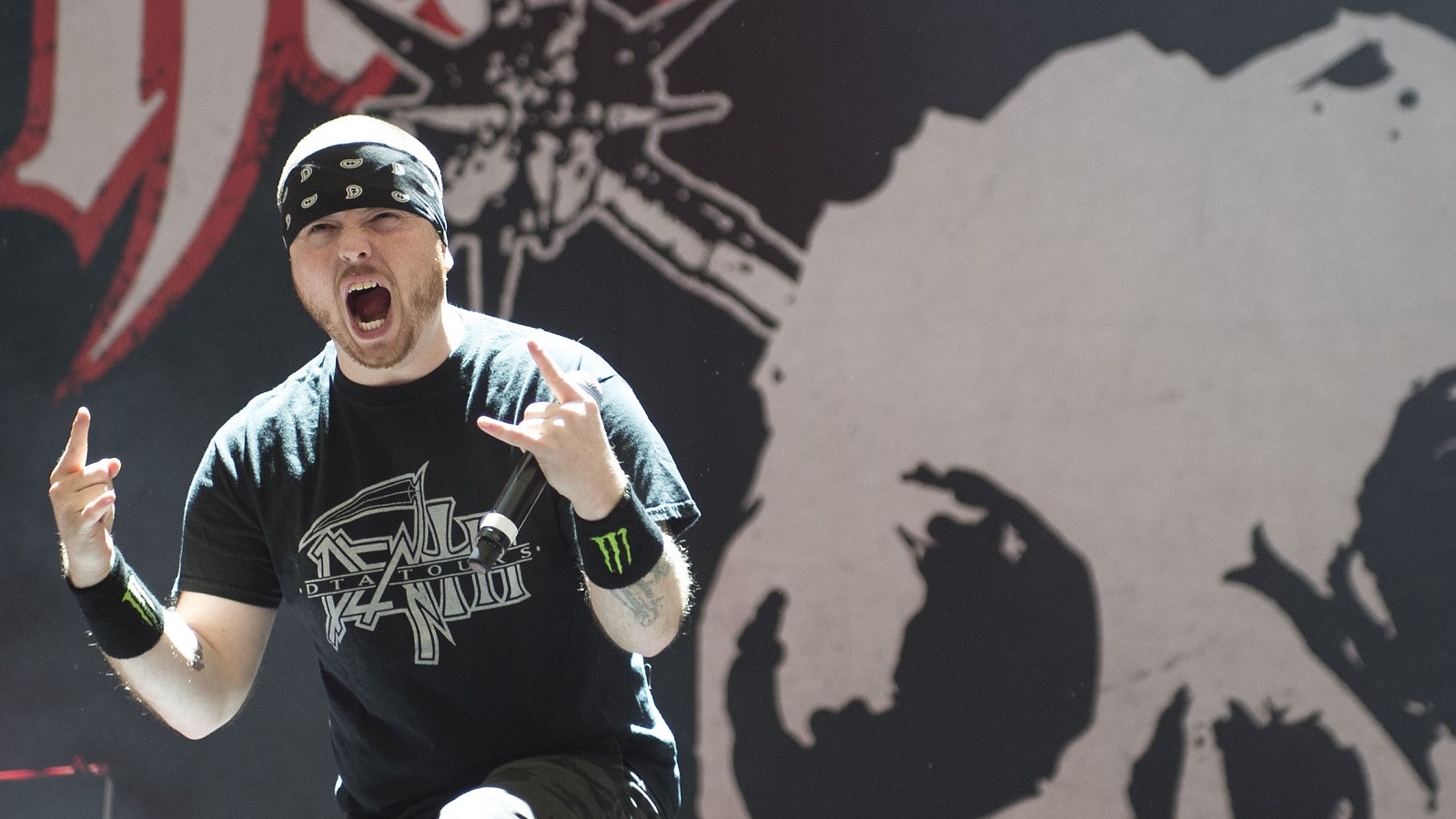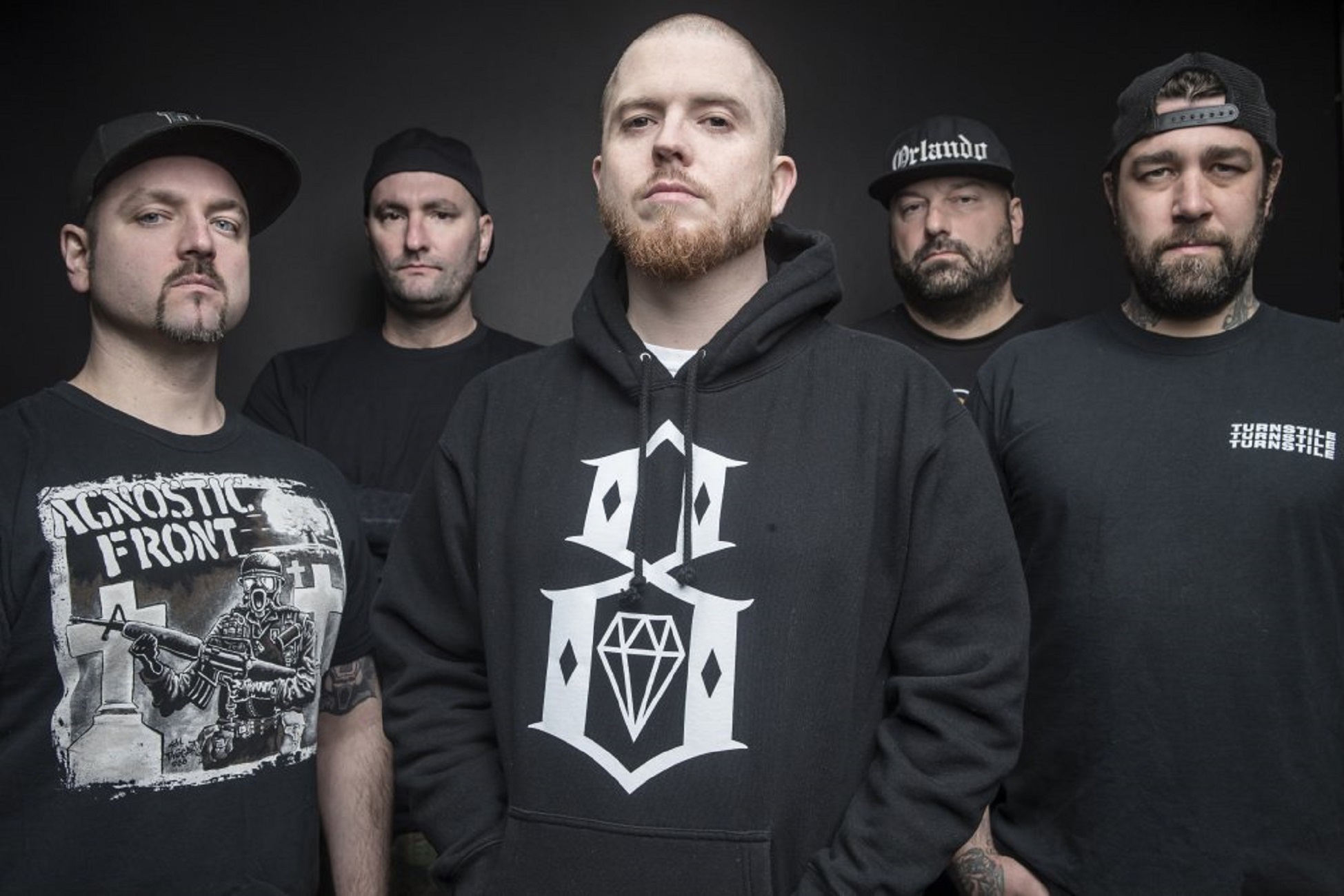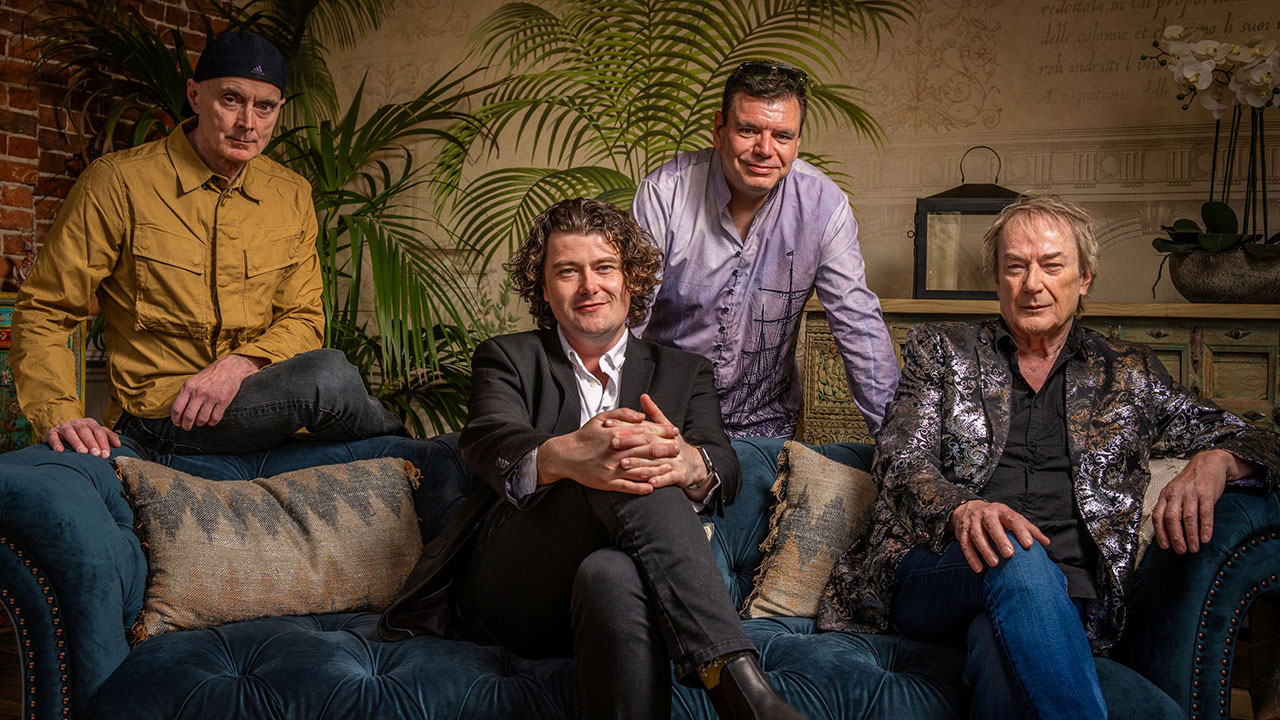Jamey Jasta's track-by-track guide to the new Hatebreed album
Hatebreed's frontman lays bare the stories behind The Concrete Confessional

Hatebreed have come a long way since their formation in Connecticut in 1994.
Over the last two decades the band have become a hardcore institution, releasing six studio albums and selling almost two million records worldwide.
This week marks the release of their seventh studio album, The Concrete Confessional. Produced by longtime collaborator Zeuss (Rob Zombie, Soulfly), it brilliantly showcases every element of the signature Hatebreed sound. Inspirational, optimistic, therapeutic, defiant, vulnerable and aggressive in equal measures, it also finds the band facing up to the challenge of writing material that appeals to the fans of their core sound, whilst at the same time continuing to be progressive and original.
“When you’re a band for 20 years and you constantly have people saying, ‘Go back to the style on Perseverance or the first album [Satisfaction Is the Death of Desire],’ it’s like having a Ferrari and someone telling you to go back and ride a training wheel bike,” frontman Jamey Jasta explains. “And we still love the training wheel bike: it has great memories of being young and barely able to do what it is that you do. But that’s just where those people are at right now: they only have a training wheel bike so that’s the only bike that they can relate to.”
“With this album we wanted to ride the line a little bit and find the middle ground between the Ferrari and the training wheel bike,” he adds. “That was a fun challenge. Like, Seven Enemies is your typical ‘training wheel bike’ song and people are already flipping out when we play that one live. And that youthful, ‘ignorance is bliss’ type of energy is fun to do: sometimes you want a filet mignon but other times you just want a hot dog. You could argue that one is better than the other, but really it’s a matter of taste. So we wrote some songs where the riffs were more complicated and we wrote some songs that were super simple, so there was a little bit of something for everybody.”
Let’s get the inside story on The Concrete Confessional then…
1. A.D.
The latest news, features and interviews direct to your inbox, from the global home of alternative music.
“A.D. can stand for whatever you want: we left that open to interpretation. This was one of the songs that I had fully done before taking it to the rest of the band. I spent a lot of time reworking it after the Paris attacks and retooling around with the lyrics. I explained to the guys, ‘This song is gonna throw people for a loop, so I Just wanna give everybody a heads up.’ I wanted them to be aware in case it did ruffle some feathers but they were all for it. Even though Hatebreed hasn’t really had any political songs before, we felt like it was time to bring some of America’s social injustices to the forefront of our music so our fans can talk about that type of stuff.”
2. LOOKING DOWN THE BARREL OF TODAY
“I’ve been that guy who didn’t have enough gas in his tank to get to work, and I didn’t have enough money to get the bus. I had negative, toxic people in my life telling me that I wouldn’t amount to anything and that my generation were lazy pieces of shit, and I reconnected with that energy for this song. That’s not my life today but there are still days when I say, ‘Am I going to let this day control me? Or am I going to control the day?’ I think a lot of people can relate to that and you have to put yourself in the mindset of what got you to the table in the first place. I know there’s a lot of people out there that have cold water thrown on their dreams every day and I feel for them, but I hope they can look their detractors in the eye and say, ‘I won’t be brought down by this type of talk.’ As clichéd as it sounds, if I can play fucking stadiums with Metallica and arenas with Slipknot, then anything is fucking possible. Just follow your dreams.”
3. SEVEN ENEMIES
“For me the seven sins are seen in all different religions and cultures all over the world, but this song overall is about selfishness. It’s a universal frustration, especially when you have the right path in front of you and you’re being pulled in a destructive and sinful direction. So we just tried to put that in a song and keep it short and sweet, and also be vague enough so that people can relate to it and place it against a situation that they might be going through. It’s another one of the songs that I had completely written, arranged and ready to go, and it’s a slow, heavy, thick song that goes with the theme of The Concrete Confessional: the juxtaposition of something that’s hard and heavy with something that you want to get off your chest.”
4. IN THE WALLS
“I know some people are going to think this is a H.P. Lovecraft [American horror fiction writer, and author of The Rats in the Walls] tribute song, but it’s not. After I’ve finished writing I always go and Google my song titles and lyrics to make sure that they aren’t similar to anything else that’s out there, and I always search the iTunes stores to make sure that there’s not a ton of songs with the same name. There’s so much content and music out there nowadays, and so many people are saying the same thing, but this was one of those songs where I liked the lyrics so much that even after searching ‘something in the walls’ and finding all these H.P. Lovecraft tribute songs, I couldn’t bring myself to throw it away. It’s about mental illness and descending into a place where you have no control over your mind and thoughts.”
5. FROM GRACE WE’VE FALLEN
“I decided to write an apocalyptic type of song because I wanted to sing about stuff that’s not necessarily about me. And I don’t know if other songwriters do this, but occasionally I’ll write a guitar line that goes over a riff and is kind of like a beat, but with this song I was humming the riff and I said, ‘Well, why can’t I just do this with my voice instead of a guitar?’ Luckily, the words managed to phrase perfectly with how I was humming the lead and when I tracked the demo our producer Zeuss was like, ‘Wow, this is cool because it’s dare I say melodic, but also very heavy and dark.’ Sometimes you just have a happy accident like that, where the lyrics just phrase correctly over the riff, so then I wrote the verses around the chorus to make the whole song work with the theme, which is the second coming of Christ. Every religion has their apocalyptic imagery and it’s all in this song.”
6. US AGAINST US
“I knew we needed a bridge in the middle of the record that had to have an upbeat, Agnostic Front/Discharge type of vibe, but with another social issue brought to the forefront, and this is that song. It was inspired by all the police brutality in the States, and all the media commentary around the brutality. In America that stuff really sells, which is why I sing the line “Slaves to the screen / Disciplines of grief.” The more the media demonises the police, the more eyes are watching and the more ads they sell, because people can’t get enough of it. And it’s not just that: it’s also Donald Trump and everything that keeps people locked to a screen instead of going out and meeting people in their community and living their life. People can read into the song however they want, but the basic inspiration during the writing of the record was all these new incidents that kept popping up and the media’s reaction to them: ‘What’s the new outrage of the day? How can we keep people locked to their TVs and iPads? Because if we can keep them on there then they’re not out there doing what they need to do to get ahead.’ The message of the song is to get out there and gain knowledge for yourself.”
7. SOMETHING’S OFF
“Since the very beginning of this band, every day after the show, even back in the snail mail days, we’ve gotten letters from our fans telling us that our music has helped them and inspired and motivated them, and you never get tired of hearing that. It’s a cyclical power. But the bigger and more popular you get, the more pressure there is on every element around you and that can cave in on itself, and when the success or failure of your band rests on your shoulders it can be very daunting. The difference between depression and anxiety, for me, is that one is the past and one is the future: depression is stuff that you’ve been through that still haunts you or maybe you regret, and anxiety is worrying about the future and torturing yourself thinking that something is going to go wrong. I find when I put those feelings into a song it’s like writing them down and throwing the piece of paper into the fire: it’s like being absolved from those feelings. Hopefully people will hear this song and relate to it, and perhaps occupy a different headspace for those three minutes.”
8. REMEMBER WHEN
“This is like an anti-nostalgia anthem that people aren’t supposed to take too seriously, and if people are hurt by it then they need to kind of look at their lives. I’m not a nostalgic person. All I have is today: all I have is now. I can’t be caught up in what happened in 1997. I appreciate that people enjoyed that time but it has no bearing on today. It’s in the wake, and the wake is the water behind the boat: it has no bearing on the direction of the boat. It’s the captain of the ship controlling the boat that decides the direction. Sure, I was nostalgic once. In 1991 I was listening to records that came out in 1977. But as I got older and the bands that I grew up listening to started to make really good current records – bands like Testament, Exodus, Kreator and Accept – that stood up to current music, that was really inspiring to me. I love all their old records and occasionally I enjoy going back and listening to the stuff that I was listening to in the ‘90s, but I’m much more excited by what’s happening now. I support what’s going on now, because the best times are now and all we have is now.”

9. SLAUGHTERED IN THEIR DREAMS
“Everywhere all over the world, people are fighting to let it be known that there are young people dying in their sleep. It becomes a war for publicity, when really there shouldn’t be any innocent people dying in their sleep. It blows my mind that it’s still going on. Even though there are bad people out there that need to get what they deserve, a lot of the time the collateral damage and casualties of war are young children, and hopefully by writing a song like this we might strike a nerve with people. I felt like we had to do something and at least try to make a difference. I also tracked this song the night that Lemmy died, and I went in and did like this layer vocal behind the main vocal, Lemmy style. If you listen in carefully you’ll be able to hear it: my secret tribute to Lemmy.”
10. THE APHEX WITHIN
“I wanted a big sing along for when we go to Germany or South America or wherever, like a big Misfits-y type punk song that people can sing along to. We’ve only ever had one of those in our career: a song on the self-titled album [2009] called No Halos for the Heartless. That song has kind of become like a cult favourite but we’ve never played it live, so I said “Let’s do it again, but let’s get it right this time.’ So Wayne and a couple of our friends, who we call the A-team, came in to do gang vocals and it came out great. The song itself is loosely based on a scene in the American Sniper film, and the idea that one man’s wolf is another man’s sheep. It’s like a take from both sides: how far would you go to defend your family and friends?”
11. WALKING THE KNIFE
“With this song I was a little like, ‘Do we really need another addiction song?’ But I think it’s important, if anyone’s out there struggling with addiction, to know that one year, two years or three years clean or sober is nothing like 12 or 13 years clean or sober. So it’s just from a different standpoint and place. You will go through the times when nothing seems right, but it doesn’t mean you should go back to trying to function while you’re being controlled by a substance.”
12. DISSONANCE
“There was a point where we got word that we weren’t going to be a part of something, and there was an opportunity for the band that didn’t materialise based on the sound and the name of the band. Even though we’ve had glimpses of mainstream attention and exposure being in films and on the Ozzfest bill and shows with Metallica and Slipknot, a lot of times people hear Hatebreed and they assume that it’s just noise. But outside of the bands that I loved growing up, everything else was noise to me and I think a lot of heavy music fans can relate to that. We get looked at like we’re crazy because we listen to this shit. People say to me, ‘You’re 39 years old and you’re still doing that?’ But I look at the stuff they’re reading in the paper and the music they’re listening to, and I look at that as noise. One of the lines in this song is ‘All I hear is dissonance,’ and to me that’s the rest of the shit that’s out there: that’s all noise to me.”
13. SERVE YOUR MASTERS
“We wanted to close the album strong, like if it was a live set we’d want everyone to leave the show with sore necks from head banging, drenched in sweat and maybe a little blood from hitting the pit. This song was kind of our way of saying that the music is the power. People can read into it however they want, but to me it’s just about the power of the riff and the power of the music. We wanted to leave people wanting more as well, like they’re not satisfied, so then we can do it again. That was the statement that brought us to the table going back to 1997, so again it was about reconnecting with that energy just enough to keep on with the message and overall movement of not being satisfied and always having that desire to keep writing heavy music and saying things that are important to us, and being able to go out and play the songs live and have them fit seamlessly in the set, which we’ve just done with some of the biggest headline shows of our career. It’s satisfying in a way, but there’s always more.”
The Concrete Confessional by Hatebreed is out now on Nuclear Blast.
Check out more from Hatebreed in our archive.
Hatebreed: Inside The Concrete Confessional
Hatebreed: Jamey Jasta's guide to having a positive mental attitude
DJ, presenter, writer, photographer and podcaster Matt Stocks was a presenter on Kerrang! Radio before a year’s stint on the breakfast show at Team Rock Radio, where he also hosted a punk show and a talk show called Soundtrack Apocalypse. He then moved over to television, presenting on the Sony-owned UK channel Scuzz TV for three years, whilst writing regular features and reviews for Metal Hammer and Classic Rock magazine. He also wrote, produced and directed a feature-length documentary on Australian hard rock band Airbourne called It’s All For Rock ‘N’ Roll, and in 2017 launched his own podcast: Life in the Stocks. His first book, also called Life In The Stocks, was published in 2020. A second volume was published in April 2022.

